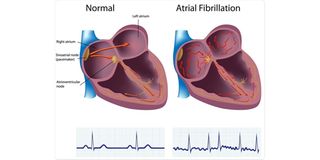Chronic atrial fibrillation a condition that killed President Magufuli

What you need to know:
- In a March 2020 interview Dr Patrick Kisenge from the Jakaya Kikwete Cardiac Institute (JKCI) says Atrial fibrillation is an irregular and often rapid heart rate that can increase your risk of strokes, heart failure and other heart-related complications.
Dar es Salaam. The Vice President Samia Suluhu Hassan yesterday announced the death of Tanzania’s President Dr John Magufuli and she said the cause was as a result of chronic atrial fibrillation a condition that he had lived with for 10 years.
The condition according to experts affects the heart’s electrical system.
In a March 2020 interview Dr Patrick Kisenge from the Jakaya Kikwete Cardiac Institute (JKCI) says Atrial fibrillation is an irregular and often rapid heart rate that can increase your risk of strokes, heart failure and other heart-related complications.
In video that he posted on You Tube Dr Kisenge says during atrial fibrillation, the heart's two upper chambers (the atria) beat chaotically and irregularly — out of coordination with the two lower chambers (the ventricles) of the heart.
Atrial fibrillation symptoms often include heart palpitations, shortness of breath and weakness.
Episodes of atrial fibrillation may come and go, or you may develop atrial fibrillation that doesn't go away and may require treatment. Although atrial fibrillation itself usually isn't life-threatening, it is a serious medical condition that sometimes requires emergency treatment.
A major concern with atrial fibrillation is the potential to develop blood clots within the upper chambers of the heart. These blood clots forming in the heart may circulate to other organs and lead to blocked blood flow (ischemia).
Treatments for atrial fibrillation may include medications and other interventions to try to alter the heart's electrical system.





